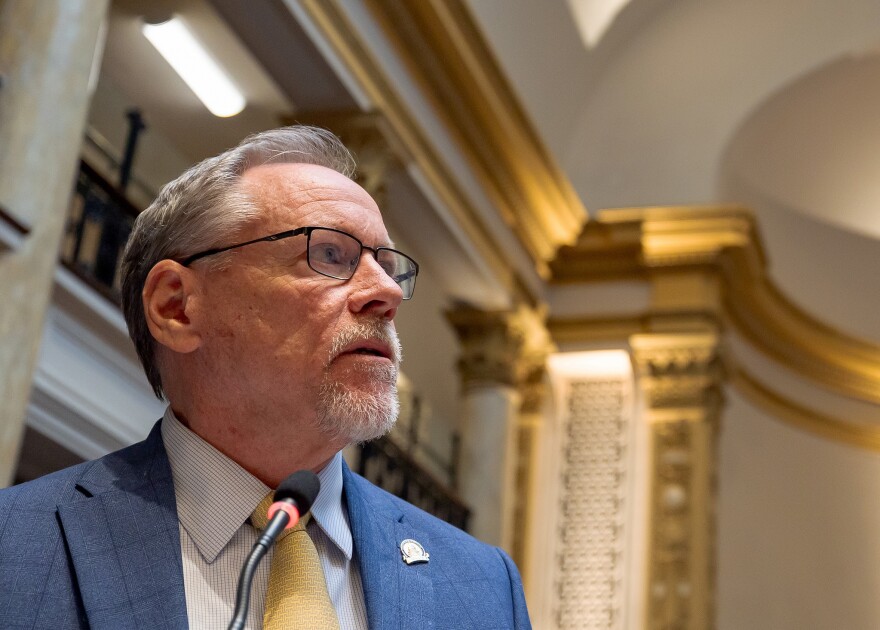Laws already on Kentucky’s books make it illegal for officials to use tax dollars to advocate for or against questions on the ballot. But after a contentious ballot question had school districts and employees across the state organizing against it, some GOP lawmakers are calling to add penalties and write an expansive definition of public “resources.”
Under the potential bill presented before an interim committee Friday, a person who violates the section would be guilty of Class D felony — which carries a one to five year prison term. Other examples of a Class D felony are third degree rape, assault and burglary. A conviction would also mean a person could not enter public employment for the next decade in Kentucky.
Sen. Steve Rawlings, a Republican from Burlington, said the law protects the “integrity” of democratic processes, but doesn’t provide an avenue for criminal prosecution or civil liability.
“While the statute now establishes this important prohibition, it currently lacks any enforcement mechanism,” Rawlings said at the hearing. “In other words, even when public officials or entities use tax dollars in violation of this law, there are no meaningful consequences.”
The resources that could not be used to advocate on public questions would also explicitly include “facilities, materials and other physical resources,” websites or social media accounts, and employees and volunteers while they’re on the clock under the new proposal. The bill specifically includes government-purchased computers and office supplies as resources too.
The bill does not specify who would be restricted from using those resources for advocacy and whether it would apply only to public employees versus private citizens. In response to emailed questions, Rawlings said the intent of the bill is not to prohibit private citizens from using facilities like parks and libraries for politics. Rawling said the prohibition would only apply to government entities.
“It takes a rule with no teeth and establishes clear, fair and enforceable standards that protect both taxpayers and the integrity of Kentucky's elections,” Rawlings said.
GOP Rep. T.J. Roberts, also from Burlington, presented the potential bill alongside Rawlings. Roberts likened spending government resources on advocacy to compelled speech.
“We should not be able to force people to finance our campaigns,” Roberts said. “Likewise, when it comes to advocacy in the public questions sphere, the lobbying sphere, I think it's deeply immoral to ultimately say that the public must be forced to advocate one way or the other when the public's not really unanimous on anything.”
Lawmakers will not be able to officially file legislation until the session begins in January. Committee chairman GOP Rep. David Hale from Wellington said he expected to have more conversation on the proposal.
“I would say Senator Rawlings has got some work to do. We look forward to seeing you back in the session when we have a shorter conversation about this,” Hale said after a nearly 50 minute-long discussion.
Roberts and Rawlings cited several incidents that angered the proponents of last year’s Amendment 2, which would have changed the state constitution to allow state dollars to fund education outside of public schools. Amendment 2 failed last year, with almost 65% of Kentucky voters saying "no."
In one case, Pulaski County Schools posted an image on its website and Facebook page saying that Amendment 2 will "harm" its schools. It explicitly said “No on Amendment 2.” After the attorney general advised that such a use of social media violated the law, the school district’s superintendent said he would respect the decision, despite disagreeing with it.
A commenter who was blocked on the original post sued the school district in federal court — the district settled, agreed to pay $30,000 and to adopt a new social media policy.
Roberts said Kentuckians should have been able to sue the district in state court too. The proposed legislation would create such a pathway.
“They ultimately did not have recourse under Kentucky law. They had recourse under the First Amendment due to the blocking, but there was nothing that any court could have done to compel compliance with KRS 65.013,” Roberts said. “Simply put, a law without teeth is not a law at all. It's just a suggestion.”
The attorney general does have the ability to use the courts to ensure compliance of state laws. Attorney General Russell Coleman indicated in his advisory clarifying that social media accounts count as a use of tax dollars, and therefore officials cannot use them for advocacy on public questions, that he would act if necessary to enforce state law.
Democrats appeared skeptical of the proposed legislation Friday, questioning the definitions and harsh penalties it would impose. Rep. Matthew Lehman of Newport questioned why the bill expands the original law to include “impartial” advocacy as well.
“‘Impartiality’ implies to me that you're going to ask somebody in an official position or a state position or a taxpayer funded position, ‘What's your professional opinion about the pluses and minuses of this constitutional ballot question?’” Lehman said. “When do we allow or not allow people paid for by the taxpayers to express more or less factual opinions?”
In an email, Rawlings said the phrasing “represents viewpoint neutrality.” Rawlings also said in the hearing that the strict penalties are meant to be a deterrent.
Correction: A previous version of this story misstated the lawyer who sued Pulaski Public Schools.





